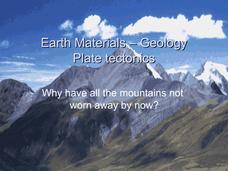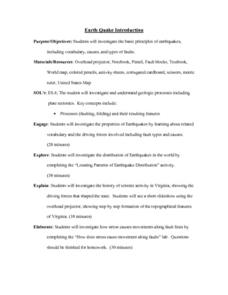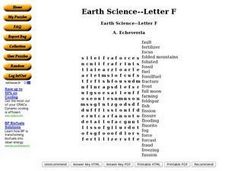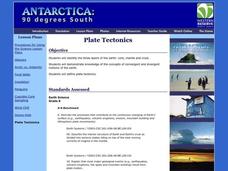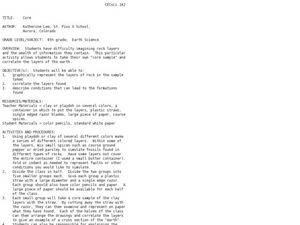Curated OER
Mountains "Fold, Fault, Erupt, and Erode"
Fifth graders conduct an experiment to demonstrate the folding and rippling of rock to form a mountain. They identify mountain chains on a map, participate in the demonstrations, and define folding fault block, igneous eruptions, igneous...
Curated OER
Folds in the Earth
Ninth graders demonstrate the forces that cause folds in the earths crust by use of clay modeling. They demonstrate there knowledge of terminology and concepts related to Earths folding processes by a written or oral report on data...
Curated OER
A Model of Three Faults - Part One
Students construct a fault model using the Fault Model Sheet imbedded in this plan. They create a 3 dimensional model of the Earth, and use dashed lines to illustrate where the fault lies. A discussion of faults follows the completion of...
Curated OER
Sandwich Stratigraphy
Two activities are included in this resource. In the first, junior geologists model sedimentary rock layers, apply the Law of Superposition, and demonstrate folding and faulting of the Earth's crust. The model is technically a sandwich....
Curated OER
New Zealand South Island Fault Model
Students explore world geography by creating a scientific model in class. In this New Zealand lesson, students research the geography and fault lines of the South Island in New Zealand. Students utilize foam board, arts and crafts and a...
Curated OER
Stressed to a Fault!
Eighth graders describe how stress builds up in the Earth's crust by the movement of tectonic plates. In groups, they relate the three types of stresses to the types of plate movements and explain how the stress causes faults to form. ...
Curated OER
Geologic Blocks: Folds Worksheet
In this geology worksheet, students explore folds in geologic blocks. They sketch ovals in blocks across fold lines. Students have six pictures to sketch, each one from a different angle or from a different size block.,
Curated OER
Regents High School Examination: Physical Setting Earth Science 2008
Throughout this earth science exam, high-school geologists complete a series of multiple choice and short answer questions about the solar system, atmosphere, and earth system. This is an amazing test, as are all of the exams developed...
GNS Science
Think like a Geologist: 1
How well do pupils play the role of geologist? Test their abilities in the first installment of a two-part series. Presented with a series of rock formation diagrams, learners write stories to match what they see in the diagrams. The...
Curated OER
Regents High School Examination: Physical Setting Earth Science 2009
Junior geologists address 50 multiple choice questions and 35 short answer questions about the earth system. Plenty of visuals are included for interpretation: diagrams, graphs, maps, photographs, laboratory setups, weather symbols, and...
Curated OER
Structure of the Earth
Sixth graders investigate earthquakes and volcanoes. They demonstrate fault lines with a folded piece of paper, conduct an erosion experiment, and construct a volcano using clay, baking soda and vinegar.
Curated OER
Edible Rock Layers
Students use edible food items to conduct an experiment that simulates the movement, folding, and faulting of rock strata like sandstone, siltstone, limestone, and shale. Students then get to eat the experiment when completed.
Curated OER
Earth Materials - Geology and Plate Tectonics
Not going into depth on any one topic, this Earth science presentation skims the crust. It touches on the materials that construct the crust and then moves into plate tectonics. This is a useful and colorful note-taking guide for your...
Curated OER
How Do Mountains Form?
In this mountain formation worksheet, students will compare the 3 different types of mountains: fold, fault-block, and dome mountains. Students will write their answers in a graphic organizer.
Curated OER
Earthquake Introduction
Students investigate basic principles and properties of earthquakes, including vocabulary, causes, and types of faults. They examine history of seismic activity in their home state, and complete "Locating Patterns of Distribution" lab.
Montana State University
Sea Floor to Summit
Who knew that mountain formation could be so entertaining? Leanr how mountains form with a resource on Mount Everest. Activities to guide learning include a simulation, project, videos, coloring activities, and worksheets.
Curated OER
Describe and Interpret Images: Folded Strata
High schoolers describe and interpret images. They make a simple sketch of an outcrop shown in a slide (or computer projection) then discuss possible interpretations.
GNS Science
Think like a Geologist: 2
All models are better in three dimensions. A hands-on lesson asks learners to create 3-D models of a rock layer using a template. They arrange the puzzle piece sides together to create models that are scientifically correct. Once the...
Curated OER
Changing Crust
For this changing crust worksheet, learners use candy bars, licorice sticks and bubble gum to simulate the 3 types of forces that change the Earth's crust. These include compressional forces, tensional forces and transversal forces. The...
Curated OER
Earth Science--Letter "F"
For this earth science worksheet, students locate and identify vocabulary terms related to earth science that begin with the letter "F." There are 24 words located in the puzzle.
Mr. E. Science
Earthquakes
Learn about the causes of earthquakes, as well as the value of seismographs, with an informative presentation. From the Richter Scale to the Mecalli Scale, learners discover elements that make an earthquake occur.
Curated OER
Plate Tectonics
Students identify the three layers of the earth: core, mantle and crust. They demonstrate knowledge of the concepts of convergent and divergent motions of the earth and an understanding of plate tectonics.
Curated OER
Earthquakes and Seismic Waves
Students explore earthquakes and seismic waves. They investigate how energy is released in the subsurface to create seismic waves. Students explore the inner workings of a seismograph and how they are used to determine the location of an...
Curated OER
Core
Eighth graders take their own "core sample" with clay and/or play-dough and correlate the layers of the earth.














